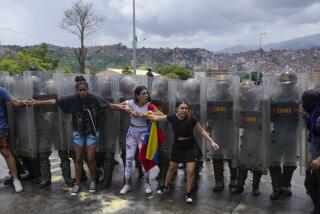Analysis : Fraud Charges Mar Ruling Party’s Apparent State Win : Opposition Fortunes Waning in Mexico
- Share via
CHIHUAHUA, Mexico — By its apparent sweep of major offices in Chihuahua state elections, Mexico’s ruling party succeeded in crushing opposition aspirations for regional power but failed to overcome charges that its electoral juggernaut is fueled in part by fraud.
Results released Monday by the Institutional Revolutionary Party, which has governed Mexico for six decades without interruption, show hefty leads in all the main races, including those for governor and for mayors of major cities.
The PRI, as the party is universally called in Mexico, claimed victory just an hour after the polls closed Sunday, when only a few remote precincts had reported. Privately, PRI officials said Monday that such a premature claim was a public relations mistake.
The election was marked by some open displays of voting irregularities, including ballot boxes delivered to polling places already stuffed with votes.
Opposition Hopes
On Monday, the National Action Party, which had hoped to become the first opposition party to break the PRI’s monopoly on state governorships, said it will ask Chihuahua’s electoral commission to annul the entire election. The commission is dominated by PRI officials.
“Our interest is not just the result, but the process,” said Francisco Barrio, National Action’s gubernatorial candidate.
It is far from certain, however, that fraud alone turned the tide of the election. The PRI worked hard for six months with its affiliated labor, peasant and bureaucratic unions to assure a heavy voter turnout. The gubernatorial winner appears to be the PRI candidate, lawyer Fernando Baeza.
PRI spokesman Jose Diaz Redondo played down voting irregularities, asserting, “A few incidents do not stain an entire voting process.”
In the mind of some PRI officials, the main drawback of voting irregularities is bad foreign publicity. Prior to the vote, the PRI promised clean elections.
“Fundamentally, the problem of the elections is the image abroad,” said Romeo R. Flores, a PRI deputy in the congress.
Some PRI functionaries, including poll watchers in charge of ballot boxes who confronted reporters, accused U.S. journalists of emphasizing fraud as part of an anti-Mexican campaign orchestrated by the United States.
Recently, Mexican officials have been angered by criticism of Mexico aired in Washington during a hearing of a Senate subcommittee chaired by Sen. Jesse Helms (R-N.C.). Charges were made during the hearing that the PRI practices electoral fraud as a matter of routine.
“Some radicals in the U.S. press wanted to see a revolution in Chihuahua,” Mario Niebla, a PRI congressman from Sinaloa state, said during a press conference in Ciudad Juarez, Chihuahua state’s largest city. “Now that that has not happened, they are disappointed. There are certain elements who appear to be dictated to by Sen. Jesse Helms.”
In any case, it is evident that the PRI tried hard to turn back the trend toward a two-party system that appeared to be forming in Chihuahua. From the PRI’s point of view, a two-party system would provoke all sorts of adverse consequences for Mexico.
“If the (one-party) system fails, it would be tragic,” according to Manuel Gurria, a member of the PRI national executive committee. “For one thing, the conservatives like the PAN (National Action) would not benefit, but the left, which is better organized, would.”
PRI doctrine holds that it alone represents all the interests of modern Mexico. The other parties are flawed, in the PRI view. According to a recent article by PRI deputy Flores, the rightist National Action “lives in the 19th Century,” while Mexico’s numerous leftist parties “think in socialist models similar to the Soviet Union or Cuba.”
National Action’s setbacks in Chihuahua probably will discourage any budding aspirations of other parties in other states of trying to wrest power from the PRI.
National Action, whose main strength is in Mexico’s northern states, itself faces the task of trying to recover from a series of setbacks that cast doubt on its future as a party that can gain significant political power.
In 1983, the National Action won seven mayors’ posts in Chihuahua, including those in its two biggest cities, Ciudad Juarez on the border and Chihuahua city, the capital. Those city halls in all probability will now revert back to the PRI.
Moreover, in state elections last year, National Action lost major races in Sonora and Nuevo Leon, two other traditional strongholds. The Sonora and Nuevo Leon results, like those now in Chihuahua, were marred by allegations of widespread fraud.
The sum of such losses means that National Action’s growth in recent years has not translated into major political victories.
Gubernatorial candidate Barrio, elected mayor of Ciudad Juarez in 1983, avoided questions about whether such losses condemn National Action to little more than a gadfly role in politics, the historical fate of opposition parties in Mexico.
“We’ll see,” Barrio said.
National Action politicians are expected to meet here today to plan strategy to deal with the election setback. Party officials had threatened to organize a civil disobedience campaign if they were not satisfied with the vote. Such a campaign was reported to include closure of businesses and the blocking of major Chihuahua roads.
Despite speculation that violence might occur during the Chihuahua vote, there have been no reports of any. In Ciudad Juarez, soldiers continued guarding public buildings and some thoroughfares Monday, while military helicopters crisscrossed the skies above the city.
Times staff writer H. G. Reza, in Ciudad Juarez, contributed to this article.
More to Read
Sign up for Essential California
The most important California stories and recommendations in your inbox every morning.
You may occasionally receive promotional content from the Los Angeles Times.










